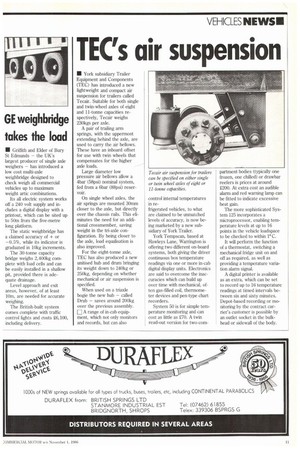TEC's air suspension
Page 13

If you've noticed an error in this article please click here to report it so we can fix it.
• York subsidiary Trailer Equipment and Components (TEC) has introduced a new lightweight and compact air suspension for trailers called Tecair. Suitable for both single and twin-wheel axles of eight and II-tonne capacities respectively, Tecair weighs 230kgs per axle.
A pair of trailing arm springs, with the uppermost extending behind the axle, are used to carry the air bellows. These have an inboard offset for use with twin wheels that compensates for the higher axle loads.
Large diameter low pressure air bellows allow a 4bar (58psi) nominal system, fed from a 6bar (88psi) reservoir.
On single wheel axles, the air springs are mounted 30mm closer to the axle, but directly over the chassis rails. This eliminates the need for an additional crossmember, saving weight in the tri-axle configuration. By being closer to the axle, load equalisation is also improved.
For the eight-tonne axle, TEC has also produced a new unitised hub and drum bringing its weight down to 240kg or 250kg, depending on whether mechanical or air suspension is specified.
When used on a triaxle bogie the new hub — called Drub — saves around 200kg over the previous assembly.
A range of in-cab equipment, which not only monitors and records, but can also control internal temperatures in re frigerated vehicles, to what are claimed to be unmatched levels of accuracy, is now being marketed by a new subsidiary of York Trailer.
York Tempscan, based at Hawleys Lane, Warrington is offering two different on-board systems, both giving the driver continuous box temperature readings via one or more in-cab digital display units. Electronics are said to overcome the inaccuracies which can build up over time with mechanical, often gas-filled coil, thermometer devices and pen-type chart recorders.
System 50 is for simple temperature monitoring and can cost as little as 270. A twin read-out version for two-corn
partment bodies (typically one frozen, one chilled) or drawbar reefers is prices at around £200. At extra cost an audible alarm and red warning lamp can be fitted to indicate excessive heat gain.
The more sophisticated System 125 incorporates a microprocessor, enabling temperature levels at up to 16 points in the vehicle loadspace to be checked to within 1°C.
It will perform the function of a thermostat, switching a mechanical fridge unit on and off as required, as well as providing a temperature variation alarm signal.
A digital printer is available as an extra, which can be set to record up to 16 temperature readings at timed intervals between six and sixty minutes. Depot-based recording or monitoring by the contract carrier's customer is possible by an outlet socket in the bulkhead or sidewall of the body.




















































































